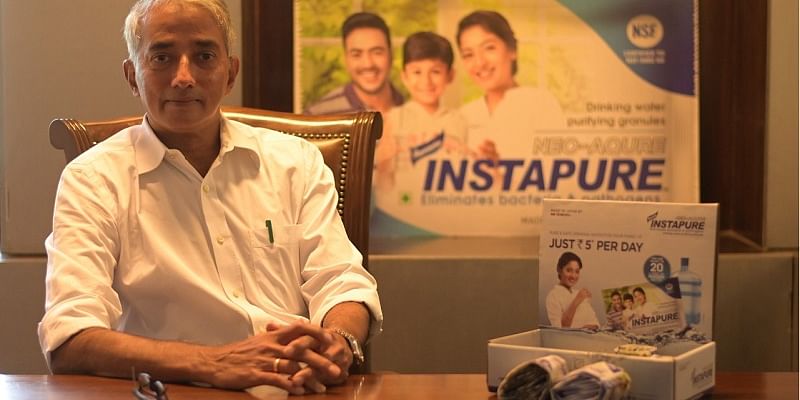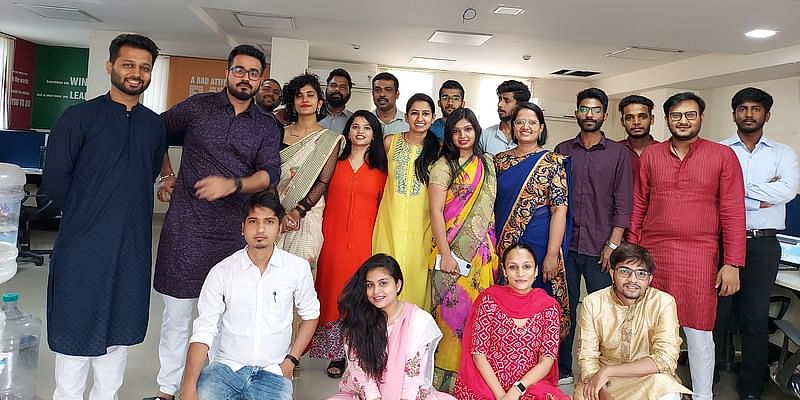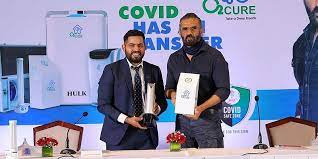The health and economic burdens of poor drinking water are enormous. According to World Bank estimates, about 21 percent of communicable diseases in India are water-related. A UNICEF report shows that waterborne diseases have an economic burden of approximately $600 million a year in India.
This is especially true for drought- and flood-prone areas, which has affected a third of the nation in the past couple of years. Less than 50 percent of the population in India has access to safe drinking water. Chemical contamination of water, mainly through fluoride and arsenic, is present in 1.96 million dwellings.
To solve this, MV Ramaswamy founded InstaPure in 2019 in Bengaluru. InstaPure is an Indian brand that has licensed a water purification chemical compound called Sodium Diecholro Isocyanurite (SDIC) from the Shikoku Chemical Corporation, a Japanese firm, to provide clean drinking water for the masses.
“Our solution ensures that water, when purified, retains all its natural minerals. It is built for Indians who cannot access clean drinking water on a daily basis and is also suitable for the health-conscious urban user,” says Ramaswamy, who is a serial entrepreneur.
Every year, the average Indian household of four needs 5,000 litres of drinking water. “We can purify many litres of drinking water for just Rs 2,500 a year,” adds Ramaswamy.
As of now, InstaPure is selling the compound in over 15,000 outlets and will get to 35,000 retail outlets in a year’s time. It is available on ecommerce platforms like Flipkart and Amazon. However, it will soon be building a D2C business where customers can buy from its own website on a subscription model.
It has sold over a million sachets to more than 100,000 users, in Karnataka and across India thanks to their sale through ecommerce business, and the company is close to Rs 1 crore in revenue in FY 2021. In FY 2022 it has a target of Rs 10 crore in revenue.
How it started?
Ten years ago, the Shikoku Chemical Corporation from Japan sent a team to India to find out how they can help Indians get clean drinking water without compromising on all the minerals essential in drinking water.
After a couple of years of research, the team went back to Japan and came up with SDIC (Sodium Diecholro Isocyanurite). The team also came with a “safe for drinking” certification from NSF (the ANSI-60), the global water consumption certifying body.
The Shikoku team also found this was the best way to purify drinking water of all types of biological contamination — including pathogens, virus and ecoli. It can eliminate all classes of bacteria.
The current water purification methods such as RO, Nano, and UF use a micron-sized mesh. Research also shows that RO removes all the essential minerals too.
The SDIC sachets were tested by the National Sanitation Foundation and Testing Laboratory (ANSI 60 certified) and showcased that this chemical compound was food grade and that it was safe for long term consumption.
Initially, the Japanese team sold the product through an agent in Tamil Nadu, but the product did not sell. They did not know how to monetise water in a price-sensitive market such as India and were distributing sachets of SDIC through a distributor or agent in Tamil Nadu. But, the lack of understanding of the Indian markets buying needs led the company to wind down its Indian operations.
“That’s when they met me through a common connect and with my retailing experience, the Shikoku Corporation representative wanted advice on how does one retail such a high impact product. While giving them advice, I jumped in to run the idea. I told him that I needed exclusive rights to the brand and that I would invest and scale up the brand,” says Ramaswamy.
The product scale
Just like any product which needs distribution, Ramaswamy began meeting retailers in Bengaluru and started explaining to them why they need to promote safe drinking water. He also narrated how an entire family can consume clean water for a year for just Rs 200 per month.
The founder invested more than $400,000 in test marketing in Karnataka to build the business and the brand, which scaled even during the pandemic, and is currently available in 15,000 retail outlets in Karnataka and is scaling towards 35,000 by the end of the year across South India. It is also scaling up through its direct-to-consumer business.
Manufactured in Japan, the product is shipped to Bengaluru and then sold to distributors on a cash and carry basis. After the product’s acceptance in Karnataka, InstaPure will be launched in Telangana, Andhra Pradesh, Tamil Nadu, Maharashtra, and Kerala by the end of 2023.
“This product is classified as a food item. It purifies any type of potable water, and there is no need for boiling. A sachet of this special formulation of SDIC, which is 0.17 grams, can purify 20 litres of water and it will keep the water clean. The formulation is proprietary to Shikoku and the brand is owned by InstaPure. Once purified, the water lasts for three months,” says Ramaswamy.
Ramaswamy says he has garnered a 14-year licensing agreement with the Shikoku Corporation and has complete rights to the brand.
The company’s business model works by paying a retailer and distributor margin and a fee to Shikoku for manufacturing the compound. The sachet costs just Rs 10 and is affordable because it costs Rs 200 per month (for 20 sachets) to purify 400 to 500 litres of water.
“With a gross margin of sixty percent, we can scale up to Rs 100 crore in three years,” says Ramaswamy.
“The challenge is to convince users that this is the safest way of purifying water. We are targeting all income brackets with this technology,” says Ramaswamy. In the next 18 months, InstaPure plans to retail in more than 50,000 outlets and will expand to Southern India and Maharashtra. It will also further its D2C offering by catering to capture customers accustomed to ecommerce and subscription.
For the moment, the brand is self-funded and Ramaswamy has a team of 30 members building the brand. The company is also readying its D2C strategy that will soon be launched. Currently, it makes less than 20 percent of its revenues through the online model.
The product competes with all water purifiers (InstaPure does not require a device, it is a powder that cleans the water in one minute) such as Kent, Aquaguard, PureIT, and several other device-based manufacturers.







